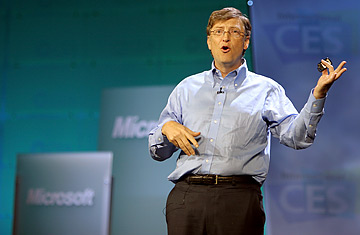
Microsoft chairman Bill Gates gives the keynote address at the Consumer Electronics Show on January 7, 2007, in Las Vegas, Nevada.
Bill Gates launched the show Sunday night with an advertorial for Microsoft's latest gadgetry. In addition to demonstrating Vista, the operating system his company will release at the end of January, Gates announced a new partnership with Ford, vowing to bring Microsoft not just into your car, but into every facet of your life. (Whether that prospect pleases or terrifies you is another matter.) He also talked about the home of the future, arguing that software would eventually land even on your kitchen counter, with recipes projected onto your work surface. He didn't say what would happen if Windows crashed just as you were mixing up your ingredients.
One thing Microsoft's founder did admit on stage is that he loves the annual battles at CES between companies trying to be bigger and better than their foes. I love walking around the floor asking 'Who's got the biggest LCD screen?' he said. And Gates isn't the only one measuring up big screens. Just hours after LG announced a giant 100-inch LCD TV Sunday, calling it the biggest such screen in the world, Japan's Sharp one-upped the Korean company with a 108-inch monster. It's big enough to require a mansion, heavy enough to demand a weightlifting crew and too costly for most of us without Gatesian salaries. But home theater enthusiasts go gaga for gigantic screens, as demonstrated by the fact that the Consumer Electronics Association expects sales of LCD TVs to grow 50% in 2007 to $12 billion.
While big screens are drawing notice at the start of this year's show, some observers are skeptical about the overall state of innovation. Benjamin Perez, a judge for CES's innovations competition, says this year's products are mainly competing with slicker interfaces, better buttons and sharper design, rather than brand-new ideas. It's more a matter of making the same product a little bit better, rather than innovating with something totally new, Perez says. After rapid creative leaps from 1999 to 2003, Perez says, the pace of innovation has been slowing among electronics manufacturers. One area that is leaping forward, though, is storage. Hitachi announced a $400 drive that will store a terabyte of data. That's 1,000 gigabytes, or enough space to store 300,000 photos, 250,000 MP3s or thousands of movies. By way of comparison, the entire print collection of the Library of Congress would likely fit on just 10 of Hitachi's new drives. This year marks the 50th anniversary of the first hard drive, which weighed almost a ton and stored just 5 megabytes of data. Hitachi's million megabytes look rather generous next to that, don't they?
